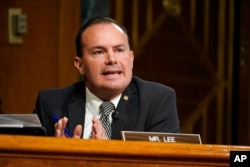A bipartisan group of senators on Wednesday reintroduced a landmark federal shield bill that would provide journalists with greater protections.
U.S. Senators Ron Wyden, Mike Lee and Richard Durbin reintroduced the bill, which is known as the Protect Reporters from Exploitative State Spying Act, or the PRESS Act.
The draft bill was previously cut from the U.S. spending bill for 2023 in December.
Shield laws protect journalists from being forced by the government to disclose information such as the identities of sources.
Almost every U.S. state and the District of Columbia have either a shield law or court recognition of qualified privilege for sources. Despite that, no federal law is in place.
"Spying on reporters to learn the identity of their sources is a finger in the eye of the First Amendment," Wyden, a Democrat from Oregon, said in a statement. "Unnecessary surveillance of journalists makes it harder to bring waste, fraud and abuse to light, by scaring off sources and reporters who are essential to a well-functioning democracy."
"Our bipartisan legislation creates strong protections for reporters, with common sense exceptions for cases when the government truly needs information immediately," Wyden added.
The bill would shield journalists' communications records from the government, with limited exceptions for terrorism and threat of imminent violence, the statement said.
"In a world where information is power, the role of reporters as truth-seekers and watchdogs cannot be understated," Lee, a Republican from Utah, said in the statement. "We must seize this opportunity and ensure that the Fourth Estate remains an indomitable force in its quest for truth."
Representatives Kevin Kiley and Jamie Raskin are set to introduce companion legislation in the House of Representatives. The bill unanimously passed the House in the previous Congress.
"Our Constitution provides that no law shall abridge the freedom of the press and inspires us to protect journalists against government overreach and abuse of the subpoena power," Raskin, a Democrat from Maryland, said in a statement. "Our bipartisan PRESS Act vindicates the promise of journalistic freedom."
The closest the PRESS Act has come to being passed was in December when it was included in the omnibus spending bill, but Senator Tom Cotton's concerns about potential leaks threatening national security led to the bill being cut.
"Sources won't come forward if they're worried about getting a knock on the door from law enforcement for doing so," Gabe Rottman, technology and press freedom project director at the Reporters Committee for Freedom of the Press, told VOA in January after the PRESS Act was cut from the omnibus bill. "If you can't ensure a source's confidentiality, then you lose crucial stories in the public interest."
"That's the whole point behind the federal shield bill," he added.
Press freedom and free expression groups welcomed the reintroduction of the PRESS Act.
"The ability for journalists to report freely without fear of retaliation is crucial to ensure an informed public, combat disinformation, and protect against repressive governance," Nadine Farid Johnson, managing director of the free expression group PEN America, said in a statement.







